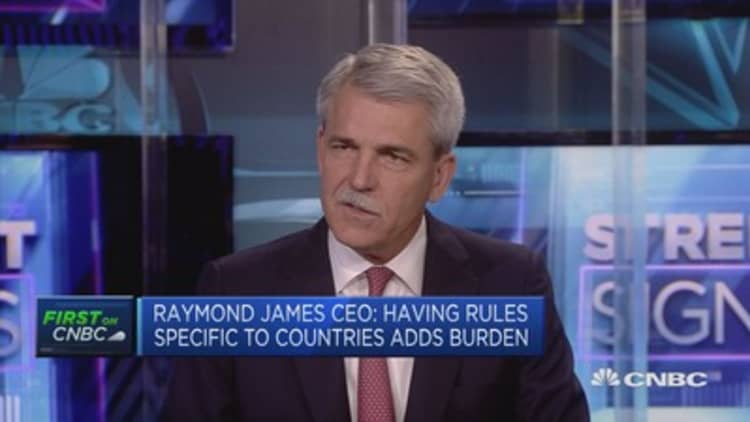
Proposals to slash the U.S. corporate tax rate to 15 percent from the current 39.6 percent would hamstring the government according to the chief of financial services giant Raymond James.
"Everyone agrees there needs to be some corporate tax rate cut and individual restructuring but 15 percent doesn't leave enough I think to pay for the operation of government," opined Paul Reilly, chief executive officer (CEO) and chairman of the financial services group which in the past year has edged its way into both Fortune 500's list of largest U.S. corporations and the S&P 500 equity index.
Indeed, the excitement with which the U.S. and global equity markets have greeted expectations of both tax cuts and deregulation under a Trump administration is now being tempered, in Reilly's view. The S&P 500 index has shot up by nearly 14 percent since the election of President Trump in early November with the MSCI World Index almost 6 percent higher over the period.
"Everyone talked about the deregulation of financials and certain stocks that are really subject to deregulation get really impacted by every announcement. Not really much has happened," he observed, speaking on CNBC's Street Signs on Monday.
"They talked about taking out the DOL (Department of Labor) rule that was just put into effect - but it happened. So I think the markets have pulled back saying 'is deregulation really coming'?" Reilly added.

The DOL rule referenced is widely known as the "Fiduciary Rule" and is a legacy of former President Barack Obama which requires advisors to act in the best interests of clients. Reilly joined the sizeable voice of industry protest concerning its June 9 introduction with detractors criticizing the legislation for allegedly limiting investor choice and potentially increasing servicing costs.
"They put a lot of process and rules that are well-intended but don't work in reality. The rules should have been fair disclosure and level payment across advisers was fine but it went too far. I don't think they understood our business," said Reilly,
The imposition of the growing global financial services regulatory burden on firms is a keen point of frustration for the head of the American group which counts over 2,900 locations between the United States, Canada and further abroad.
"It's almost near impossible because the rules change so quickly…keeping up with the different rules or even what they mean," he lamented.
"It does add a lot of burden especially if you have different methods and regulation in each country, you have to do it differently," Reilly added.


